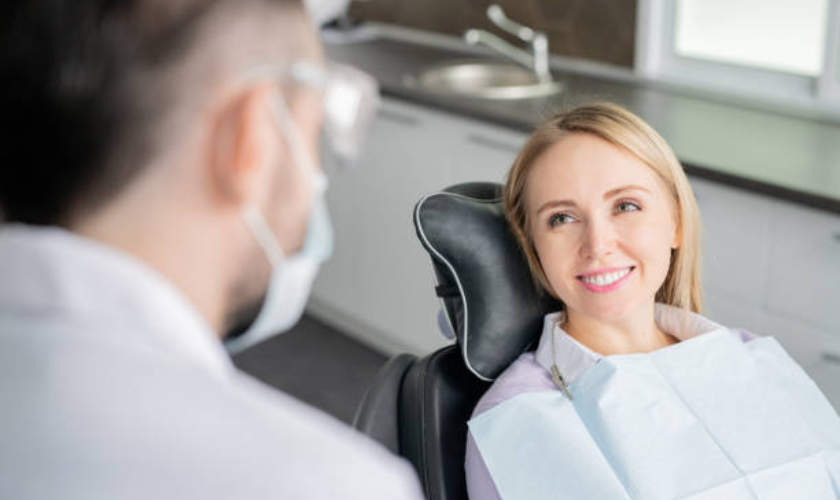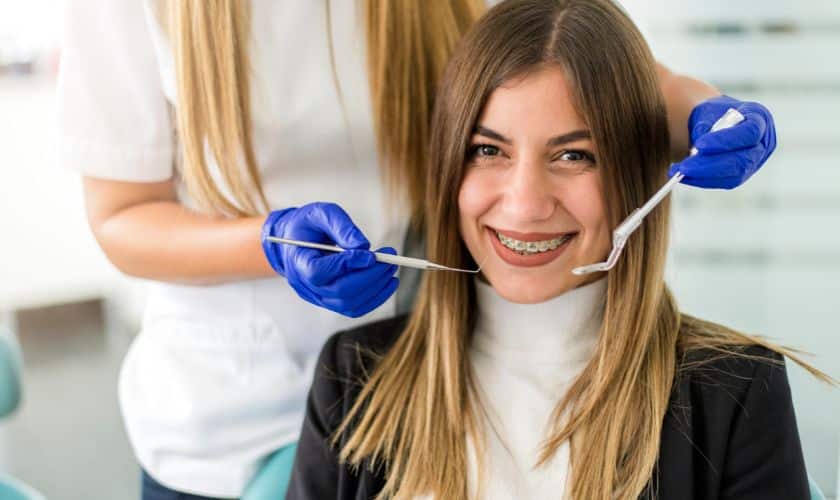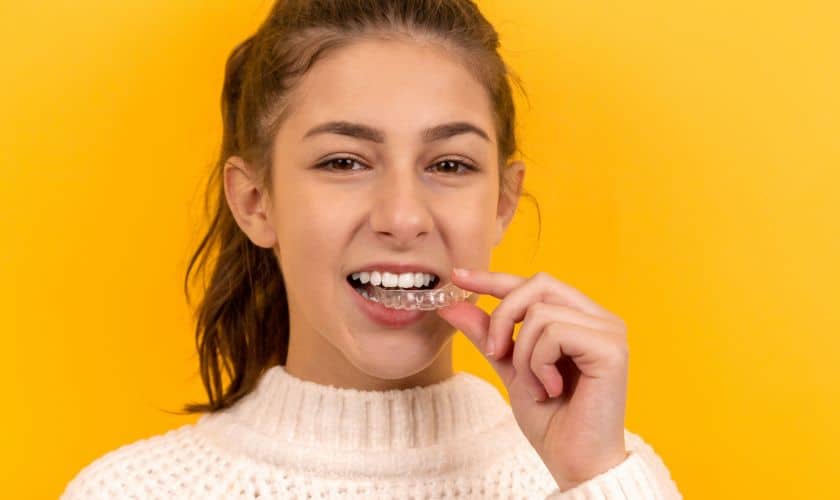The Impact of Orthodontic Treatment on Self-Confidence and Mental Wellbeing

Are you ready to unlock your true smile and unleash a newfound confidence? Brace yourself for an insightful journey into the transformational powers of orthodontic treatment. From boosting self-esteem to positively impacting mental wellbeing, this blog post delves deep into the life-changing benefits of straighter teeth. Join us as we explore how achieving that perfect smile can have an incredible impact on your overall happiness and self-assurance. Get ready to radiate confidence like never before – it’s time to embrace the transformative effects of orthodontics!
Introduction to orthodontic treatment and its purpose
Orthodontic treatment, also known as braces or ortho treatment, refers to the use of appliances such as braces, retainers, aligners, and headgear to straighten teeth and correct issues with the alignment of the jaw. The main purpose of this treatment is not just about achieving a more aesthetically pleasing smile, but it also has significant impacts on one’s self-confidence and mental wellbeing.
The goal of orthodontic treatment is to make sure that all teeth are properly aligned and in harmony with each other. This means correcting crookedness, overcrowding, gaps between teeth, overbites, underbites, crossbites, and other dental irregularities. But why is it important to have straight teeth? And how does it affect our overall well-being?
Importance of Straight Teeth
Having straight teeth goes beyond just having a visually appealing smile. It plays a crucial role in maintaining good oral health. When teeth are properly aligned, they are easier to clean and maintain; thus reducing the risk of tooth decay and gum disease. Crooked or misaligned teeth can make brushing and flossing difficult as they create hard-to-reach areas where plaque buildup can occur.
In addition to promoting good oral hygiene habits, having straight teeth can also help improve speech clarity by correcting any issues with jaw positioning or tooth placement that may affect speech patterns. This can greatly benefit individuals who struggle with speech impediments due to dental problems.
The relationship between physical appearance and self-confidence
Many people have a strong desire to feel comfortable and confident in their own skin. This often includes feeling satisfied with their physical appearance, especially when it comes to the appearance of their smile. According to recent studies, our physical appearance can have a significant impact on our self-confidence and overall mental wellbeing.
In particular, the relationship between physical appearance and self-confidence is complex and multifaceted. Our outward appearance plays a crucial role in how we perceive ourselves and how others perceive us. This perception can greatly affect our level of self-esteem and confidence.
One of the most prominent aspects of our physical appearance is our smile. A bright, straight smile is often associated with attractiveness, youthfulness, and overall good health. On the other hand, misaligned teeth or other dental issues can make individuals feel self-conscious or even embarrassed about their smiles.
This is where orthodontic treatment comes into play. Orthodontics focuses on aligning teeth, correcting bite issues, and improving jaw alignment through various methods such as braces or clear aligners like Invisalign. By addressing these concerns with proper orthodontic treatment, individuals can achieve a more confident and attractive smile.
A study published in the Journal of Cranio-Maxillofacial Surgery found that orthodontic treatment has a positive impact on an individual’s overall self-esteem and psychological well-being. The study showed that patients who underwent orthodontic treatment reported improved social interaction skills, better emotional experiences, and increased overall satisfaction with their lives.
How crooked teeth can affect self-image and mental wellbeing
Crooked teeth can have a significant impact on an individual’s self-image and mental wellbeing. Many people with crooked or misaligned teeth may feel self-conscious or embarrassed about their smile, leading to low self-esteem and confidence. This can often worsen as they get older, causing them to avoid social situations, smiling in photos, and even speaking in public.
One of the main reasons why crooked teeth affect self-image is that they are highly visible when we speak or smile. As humans, we are naturally drawn to faces, and our teeth play a crucial role in facial aesthetics. When someone has crooked teeth, it can be the first thing people notice about their appearance. This constant focus on their dental imperfections can lead to feelings of insecurity and anxiety.
Moreover, having crooked teeth can also make individuals feel like they do not fit into society’s standard of beauty. The media often portrays perfectly straight and white teeth as the ideal image of attractiveness. People with misaligned teeth may feel like they do not measure up to this standard and are therefore not as attractive as others. This comparison to an unrealistic beauty standard can take a toll on one’s self-confidence.
The shame and discomfort that come with having crooked teeth can also lead people to hide their smiles or cover their mouths when laughing or talking. It is common for people with misaligned teeth to develop avoidance behaviors due to feeling insecure about their appearance. This constant worrying about how others perceive them based on their dental imperfections can cause stress, anxiety, and even depression.
For children and teenagers, crooked teeth can be especially challenging as they are still developing their self-image and self-esteem. Bullies may use their dental imperfections as a way to tease and bully them, causing even more emotional distress. This can result in social isolation and a negative impact on their overall mental health.
Finally, having crooked teeth can also affect an individual’s professional life. Many jobs require good communication skills and a confident smile to succeed. People with misaligned teeth may feel hesitant to speak up or participate in meetings, leading to missed opportunities for career advancement.
Research studies on the psychological effects of orthodontic treatment
Research studies have been conducted to explore the psychological effects of orthodontic treatment on individuals. These studies have shed light on the impact of having braces or other forms of orthodontic treatment on self-confidence and mental wellbeing.
A study published in the American Journal of Orthodontics and Dentofacial Orthopedics surveyed adolescents who had undergone orthodontic treatment. The results showed that there was a significant improvement in self-esteem, social acceptance, and overall satisfaction with appearance after completing orthodontic treatment. This suggests that orthodontic treatment can positively influence an individual’s self-perception and confidence.
Another study published in Psychology Today examined the psychological benefits of orthodontic treatment in adults. The findings revealed an increase in self-esteem, improved physical attractiveness perception, and reduced social anxiety after adults had completed their orthodontic treatment. These improvements were sustained even six months after the completion of their treatment, indicating long-term positive effects on mental wellbeing.
In addition to improving self-confidence, research has also shown a correlation between orthodontic treatment and overall mental health. A study published in the European Journal of Orthodontics found that individuals who underwent corrective jaw surgery as part of their orthodontic treatment reported decreased levels of depression, anxiety, and stress post-procedure. This suggests that by addressing dental issues through comprehensive orthodontic treatment including jaw alignment correction, it may lead to better overall mental health outcomes for individuals.
Exploring the different types of Braces and their impact on self-esteem during treatment
When it comes to orthodontic treatment, many people often only focus on the physical changes and benefits. However, it is important to also consider the impact of different types of braces on an individual’s self-esteem during treatment. This is especially true for teenagers and young adults who may already be struggling with self-confidence issues.
In this section, we will explore the various types of braces available and how they can affect a person’s self-esteem during orthodontic treatment.
- Metal Braces: Traditional metal braces are made up of brackets, wires, and rubber bands that work together to shift teeth into proper alignment. They are one of the most common types of braces used in orthodontic treatment because they are highly effective in correcting misaligned teeth. However, their noticeable appearance can be a source of embarrassment for some patients. For individuals concerned about their appearance during treatment, many orthodontists now offer colored or clear rubber bands that can help make metal braces less conspicuous. Additionally, as metal braces have become more commonplace and accepted in our society, many people have become more comfortable embracing their smile while undergoing treatment.
- Ceramic Braces: Similar to traditional metal braces, ceramic braces also use brackets and wires to move teeth into alignment. The main difference is that ceramic braces come with clear or tooth-colored brackets that blend in with the natural color of your teeth making them less noticeable. Ceramic braces can be a great option for those looking for a less conspicuous alternative to traditional metal braces. However , the cost of ceramic braces is usually higher than metal braces, making them less accessible for some patients.
- Lingual Braces: Lingual braces are placed on the back surface of teeth, making them virtually invisible. They work similarly to traditional metal braces but can be more challenging to clean and maintain due to their placement. While lingual braces may not affect self-esteem during treatment, some people may find speaking and eating with them a bit more challenging. Additionally, lingual braces tend to be more expensive than other types of braces due to their customized nature and specialized placement.
- Invisalign: Invisalign uses clear aligners made from BPA-free plastic that are custom-made to fit over your teeth and gradually shift them into proper alignment. These aligners are removable, which makes it easier to eat and brush your teeth during treatment. Invisalign is considered one of the most discreet orthodontic treatments available as the aligners are virtually unnoticeable when worn. However, they may not be suitable for all types of orthodontic cases and may require more discipline in wearing and changing out the aligners regularly.
- Self-Ligating Braces: Self-ligating braces function similarly to traditional metal or ceramic braces but do not require rubber bands to hold the wire in place. This makes them less noticeable and also reduces the frequency of adjustments needed during treatment. Self-ligating braces can be a great option for those concerned about the appearance of traditional braces. However, similar to ceramic braces, self-ligating braces tend to be more expensive than metal braces.
While there are several types of braces available for orthodontic treatment, it is essential to discuss your concerns and preferences with your orthodontist before making a decision. They can provide you with the necessary information about each type of brace and help you choose the best option based on your orthodontic needs and personal preferences. Remember, at the end of your treatment, a straighter smile and improved oral health will greatly outweigh any temporary self-esteem concerns you may have during treatment.



